#Naotora is one of those people born too early. His ideas would've been right at home in an era like ours
Text
* NAOTORA, META ┆ NONCOMFORMITY.
Ever since he was a child, Naotora has always been considered the odd one out, and to this day (now a 27 year old) he continues to be seen that way by society at large, although they have started to slightly warm up to him due to his title and accomplishments.
To begin with, he was born as the son of one of the most powerful bands in Hi no Moto's history (and was technically in line to become heir as the third son if something were to happen to both of his older brothers, which was likely and even happened) yet Naotora has never lived up to the expectations of the feudal era he lived in.
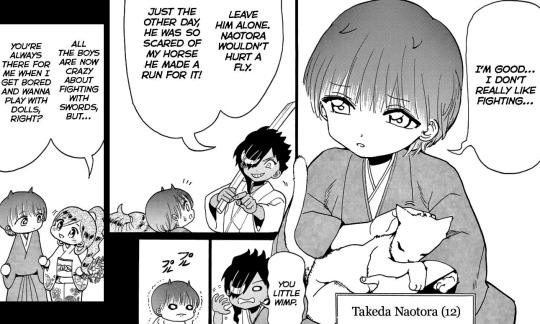
While every son's desire was to lead the family (regardless of whether they were nobles, farmers etc), Naotora has never wanted to become the Takeda head. He was perfectly content with supporting his older brothers from the sides and clearly wished for that to be the case, putting all of his hopes into his brothers' strength and boasting about them to the other four generals instead of ever putting himself or his own abilities into the spotlight.
While the bushi society expected every son of nobility (much less royalty like the Takeda) to be able to fight and to enjoy fighting since as early of an age as possible, Naotora never wanted to learn how to fight, disliked doing it when prompted/forced to and was scared of anything even remotely threatening (i.e: he was terrified enough to run from the horse Soma, the ideal son in society's eyes, was riding). Naotora has been, for the entirety of his childhood, the polar opposite of what everyone has wanted him to be: a "wimpy", gentle and idealistic crybaby, instead of a capable, fearless warrior.
Moreso, while Soma and Tatsuomi (who were only 2 years older than him) spent their free time sparring and honing their battle skills, Naotora spent his free time keeping Tsubasa company and playing with dolls alongside her so that she wouldn't feel lonely. In the feudal era, despite noblewomen being valued as potential wives for a household's son, they were typically never perceived as their own person and their personal desires weren't often taken into consideration. We can even see this with 14 year old Soma asking Tsubasa to marry him so that he can protect her, while Naotora never once asked anything of her and merely kept her company out of the kindness of his heart, which is what prompted her to vocalize her wish to marry Naotora when they grew older instead of accepting Soma's proposal.
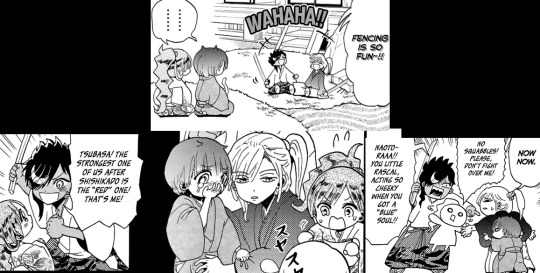
As though it couldn't get any worse for him, while society was trying to shape boys into powerful men who would never show their emotions or any sort of vulnerabilities whatsoever, Naotora was such a soft boy that he would start crying in front of others (a shame for any noble son) after being insulted by Soma once - not to mention hiding behind Tatsuomi for protection (another shame) instead of taking the logical route in society's eyes, that of challenging Soma in some way to regain his lost honor.
However, despite everything Naotora stood for as a child, the war that took his older brothers' lives forced him into the same mold as the other boys his age, except at a much faster speed than any other. In a matter of days, he underwent an identity shift & there was no longer a weak, third son who could afford to lay back and be protected. Instead, the tender boy was replaced by the sole survivor of the Takeda bloodline, a boy meant to be able to lead hundreds of thousands of people overnight and do it successfully.
Flashforward to the present day 15 years later, and the Takeda Bushi owns the biggest share of land between all of the five major bands, therefore the biggest chunk of Hi no Moto. Except, instead of the territory expansion deriving from the way society has shaped him, it came about as a result of Naotora's untouched idealism and kindness.
While the circumstances he was forced into have gotten rid of some of his childhood traits (i.e: he hasn't cried in nearly a decade, although he has in a very recent chapter whereas Tatsuomi, who had suffered the same fate, hadn't cried), nothing has managed to completely reshape Naotora into something that'd fit society's standards. He didn't steal the territories he gained nor did he battle for personal gain or honor, he merely wished to liberate every town that struggled under the oni's oppression because its people didn't deserve to suffer and because, to him, saving humankind was above all else.

And even then, while his intent could be praised even by the more rigid of the bunch, Naotora once again went against what was thought to be the correct course of action and chose to go the extra mile to save the one, measly life of a rowdy miner orphan instead of prioritizing the elimination of the kishin. Not to mention, he did so by intervening personally instead of sending a "lesser" soldier to risk their life for the child's safety.
That decision, in turn, was what saved every bushi present at Awaji Island from dying out later in the series, as that miner boy turned out to be the very savior the bushi bands sought for decades (and it wasn't just this one decision either, Naotora's intervention when Tatsuomi ordered for Musashi to get killed was what helped Musashi survive that circumstance, too - he saved Musashi twice when he didn't even know there was anything to gain from doing so, whereas everyone else only joined to protect Musashi when they found out he was the Obsidian Goddess' vessel and could serve their goals).
Naotora's idealistic view of the world can be noticed time and time again in the way he phrases things (opting to describe the generals' childhood meetings as them being close & joining hands for a mutual goal rather than being forced to spend time together in a hostage system), and we actually get confirmation that society believes him to be too idealistic and immature when even Tatsuomi, his closest friend, comments on that while being unable to see the same vision as Naotora.
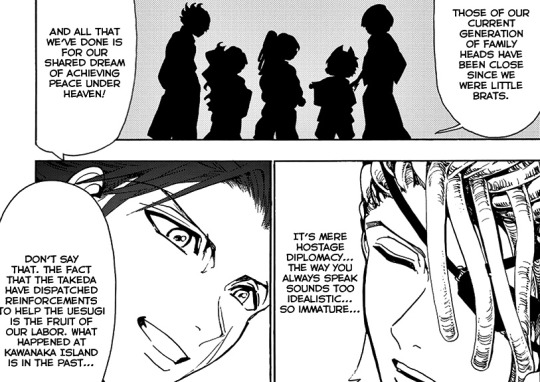
His idealism also shines in the way he sees everyone as equal, which can be exemplified through how he portrays blue souls. To society as a whole, blue souls are common, expendable and weak, only meant to serve the red and white souls. Everyone expects them to be so, and expects them to act like it. Thinking of growing out of that mold has always been out of the question, until Naotora did it, obliterating yet another carefully built tradition.
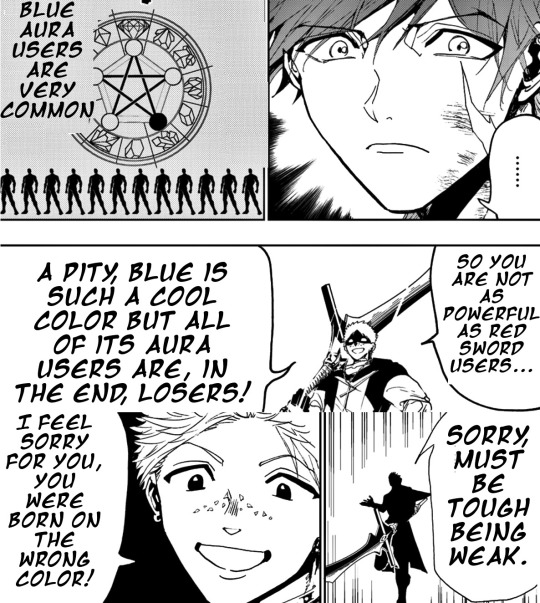
He learned how to use his blue soul to do what no other human thought possible, and wielded the powers of nature (even creating a weapon that would have killed a white soul in one hit if Shiro hadn't sacrificed his sword to save his life). Instead of withholding this power for himself and acting as superior, Naotora then humbly proceeded to use it as a way to motivate fellow blue souls to not give up just because the hands they were dealt by fate weren't what society had considered special.
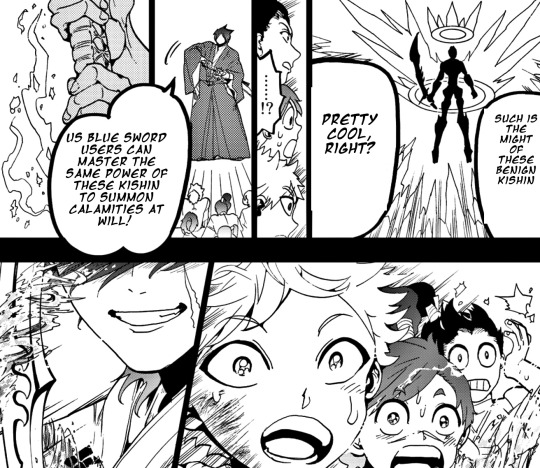
In addition to this, Naotora is the only grand general we know of thus far who is aware that people are talking badly about him behind his back yet tolerates the insults towards his person or pretends not to notice them instead of cutting off the offender's tongue or sending them to their death (as was customary when someone even dared think ill of royalty like him):

He is also the only grand general who actively seeks (& creates) personal bonds with everyone, including soldiers from other bands (i.e: him personally visiting the Uesugi troops to ask them to lend him their support in battle instead of asking Tatsuomi to dispatch them against their will as was the procedure, which even got Naoe on his back because of how blatantly against the customs Naotora's actions were).
His vassals are incredibly chummy with him too, calling him "Nao-chan" and "leader" and scolding him, instead of addressing him as "Lord Takeda" and being formal as is the case for every other grand general. Naotora doesn't consider himself as superior the way society would expect someone of his status to, he sees himself as an equal to everyone else, no matter who they may be (it's why he allows Musashi, some random kid from the bums, to address him as "my rival").
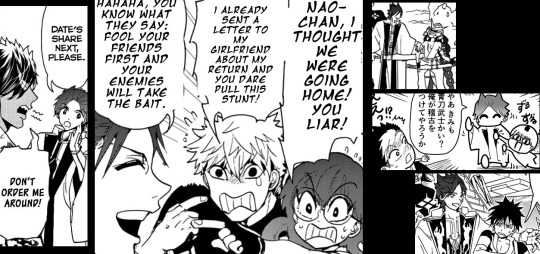
Cut forward to Naotora's relationship with Naoe and its development into a marriage, and Naotora once again chooses to defy tradition, except this time around to an even more severe degree in society's eyes.
Feudal Japan (Hi no Moto) functions on the belief that the individual doesn't exist and that every person must subordinate themselves to the household they were born in and always follow what is best for the family, first and foremost. In Naotora's case, as the last remaining member of the Takeda bloodline, that would mean he ought to marry a woman to guarantee a heir, or at the very least keep concubines in order to continue the bloodline. He doesn't do either. Instead, he proposes to Naoe, a man, and devises a scheme that'll allow him to continue the Takeda legacy in name by adopting an orphan similar to him and lying to the disgruntled masses about how the said child is his biological son.
Naotora does put plenty of importance on family, but nevertheless he prioritizes his own interests (the wish to live a happy life, to create a future that doesn't have to hang on expectations) a smidgen over the household's, something atrocious and daresay blasphemous for the era he lives in. Yet he goes even further. Marriages in this period are exclusively held between two people of the same social status, and so Naotora could have at least chosen to marry a fellow royal, such as Tatsuomi, Tsubasa, Shishikado or Soma, to save a bit of face after having dragged his own name through mud. He doesn't, and opts to go ahead with his plans of marrying Naoe, despite the other being a noble of a lower status than him.
And as if that wasn't enough, Naotora delivers one last hit to everything their society stands for. In spite of the bushi mainly marrying within their own band to ensure a honorable match between families of the same background and status (even though they eventually had to marry their own distant relatives, hence the similar hair color everyone has in each band: Takeda-Blue hair, Uesugi-Purple hair etc), Naotora chose to ignore that practice as well, and married Naoe, someone who isn't even from a subordinate band to the Takeda, but rather from an entirely different band than his own.
#muse: takeda naotora.#* takeda naotora. / development.#long post /#I am totally normal about this man. as you can all clearly see#Naotora is one of those people born too early. His ideas would've been right at home in an era like ours#but he was born in the feudal era instead; in a country that praises traditions above all else no less
3 notes
·
View notes